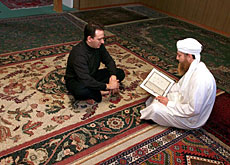Turks add spice to life in Switzerland

Switzerland and Turkey are vying for a place in the final stages of the World Cup, an event causing great excitement among the large Swiss-Turkish community.
On a national and regional level, many residents of Turkish nationality have distinguished themselves on the Swiss stage – among them the star footballers Hakan Yakin and his brother Murat.
Owing to injury, neither of the Yakin brothers will be among the Swiss 11 facing Turkey in the second leg of the playoffs in Istanbul on Wednesday night.
While the struggle for a place in the 2006 World Cup in Germany has turned the spotlight on football, the Turkish contribution to the Swiss ’cause’ is not limited to the beautiful game.
Prominent immigrants from Turkey include the Kurdish writer and Winterthur resident, Yusuf Yesilöz, the author of books and articles in German. Others are Alpaslan Korkmaz, entrusted by canton Neuchâtel with the international promotion of its economy, or Akin Altintren, president of the Zurich city council of foreigners.
Like their Italian counterparts, Turkish expatriates are well known for their entrepreneurial spirit. However, younger members of the community still experience discrimination in the employment market.
Escape from military rule
Historically, the first Turks arrived in Switzerland in the early 1960s as migrant workers. Jobs were available primarily in the industrial, catering and textile sectors.
“Unlike the situation in Germany, Belgium and France, this migration occurred outside official agreements between the two countries and the majority of Turks came to Switzerland on their own initiative,” Bülent Kaya of the Swiss Forum for Migration and Population Studies explained to swissinfo.
However, after the 1980 military coup, emigration from Turkey ceased to be a purely socio-economic phenomenon; political factors also began to exert an influence. Opponents of the new regime – especially students and young left-wing activists – were forced to flee the country.
From 1986, the flow of refugees was given a further boost by government repression of the Kurdish community. It has been estimated that over a period of some 20 years (from 1981 to 2000) more than 60,000 Turkish nationals applied for asylum in Switzerland.
Following reforms in Ankara, the flow of refugees has now slowed to a trickle, Kaya says, and the small number of new arrivals are mainly people seeking to be reunited with their families.
Professional discrimination
The Turkish community in Switzerland, of which over 90 per cent is located in the German-speaking cantons, now numbers approximately 80,000, concentrated particularly in the cities of Zurich, Basel and Aarau.
“In my view, Turkish integration into Swiss society has been a success, although there is still a certain amount of discrimination in the workplace,” says the Swiss Forum for Migration Studies official, quoting from a study carried out as part of a national research programme.
The study shows that second-generation Turks, with like-for-like qualifications in terms of secondary and further education, are one-third less likely to find work than young people holding a Swiss passport.
Peri Even, former editor of Treffpunkt Schweiz (a Swiss Radio German-language broadcast aimed at Turkish immigrants) also believes that on a social level “the Turkish community is not always fully integrated and sometimes feels rather isolated”.
National associations
Perhaps as a way of escaping this isolation – but more probably as a way of keeping customs and traditions alive – the Turkish community has a strong tendency to form associations.
Cultural societies, sports clubs – particularly football teams – and religious organisations have sprung up in virtually all major Swiss towns.
“In the past, large numbers of inhabitants of a particular Turkish village tended to emigrate to the same Swiss region or commune, where they formed associations bearing the name of their place of origin,” explains Even.
Turkish workers, who can be found in the metalworking, textile and food industries, are known for their entrepreneurial spirit. “Many of them follow the ‘Italian tradition’ and establish themselves as successful traders,” says Kaya.
So it is hardly surprising to find the smell of lamb, onions and honey pudding wafting from kebab and falafel stalls. These are springing up in ever greater numbers, and the “Doner Kebab” sign can now be seen in railway stations, shopping malls and city centre streets from Geneva to St Gallen.
Add to all this evenings enlivened by belly-dancers, or the coffee shops where clients can try their hand with the narghilè (the long water pipe used to smoke aromatic tobacco), and it is clear that the spicy fragrances of Turkey are helping to give Swiss society just a hint of the Orient.
swissinfo, Luigi Jorio
77,534 Turkish citizens (without dual nationality) were living in Switzerland at the end of 2004.- 38,626 in 1980.
12,215 in 1970.
Over 90% of the Turkish community lives in the cantons of German-speaking Switzerland.
The label “Turks”, used in official statistics to describe immigrants of Turkish nationality, covers a wide variety of profiles. These include Kurds and Alevites.
The Turkish community celebrates its own national festivals (including Cumhuriyet Bayrami – the proclamation of the Republic – on October 29) and religious commemorations, particularly Islamic feasts.
The diaspora in Switzerland is particularly active in terms of associations and sports clubs, and organises frequent cultural events (cinema and music).

In compliance with the JTI standards
More: SWI swissinfo.ch certified by the Journalism Trust Initiative












You can find an overview of ongoing debates with our journalists here . Please join us!
If you want to start a conversation about a topic raised in this article or want to report factual errors, email us at english@swissinfo.ch.